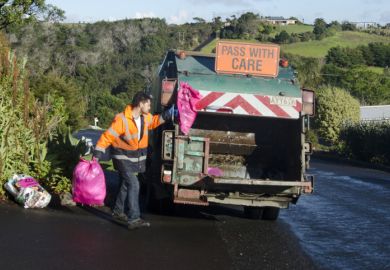Rather too many of my childhood summers were spent exploring the decaying industrial infrastructure that littered the Black Country in the 1980s. I thought I was indulging in (largely) harmless thrill-seeking, but Explore Everything: Place-Hacking the City suggests that my trespasses were invested with rather more social, political and psychological resonances than I thought at the time.
The book takes us into the world of urban exploration, or urbex: a global, if numerically tiny, movement made up of various sub-tribes all obsessed with penetrating the hidden worlds of the city. Ruins, half-completed building projects, bridges, sewerage and underground rail systems are all targets of the crews of place-hackers that the author immersed himself in during the course of his doctoral research for the book. Garrett is an engaging narrator who writes in an exuberant, at times breathless, style that catches something of the ecstasy he and his fellow urbexers must feel when they stand atop a skyscraper and watch a thunderstorm rolling in.
His work has received some serious and sustained media attention. This book has already been the subject of broadsheet profiles and a discussion at the Barbican featuring Will Self; there are also whispers of film rights being optioned. Garrett hit the headlines when he posted pictures online of himself and a number of other urbexers scaling London’s (then unfinished) Shard, Europe’s tallest skyscraper. Predictably, the images went viral. Urbex has attracted a huge following online, while much of the media, even those at the centre and right, have enjoyed spinning out a series of nerdy hero/playful anarchy storylines with Garrett front and centre.
But Explore Everything, in trying to bring all this together, attempts to be too many things. It is an academic monograph – informed by liberal doses of cultural theory – on the demoralising possibilities that the neoliberal city offers its citizens and how they might (and should) be subverted; it is a fast-paced tale of adventure, exploration, capture, escape and hedonism and also a collection of the incredible photographs documenting the escapades that Garrett participated in during his research.
It’s all a bit too much. At best, it half works. Conceptually, while there is enough here to negotiate a PhD viva, it adds little that we haven’t seen before in the published literature. Iain Borden’s work on skateboarding, for example, covers similar ground. Moreover, there are few surprises in the bodies of work that Garrett cites in Explore Everything. There are some great metaphors and analogies here – I love the idea of the infrastructural city being infinitely connected, while the social city it serves is so divided – but few are pursued sufficiently. The conceptual framing of the work remains somewhat flimsy. The adventure narratives make great reading, but they begin to wear towards the end and become weighed down by interpretation and conceptualisation. The confluence of these narrative strands is successfully realised only rarely. In the end, Garrett isn’t really convincing that the activities he describes are imbued with quite the significance he attaches to them.
Garrett’s fellow urbexers are present throughout but only ever sketchily drawn, an inevitable consequence of the need to protect their identities. Their presence in these tales is too light. Ultimately, I found it hard to engage with characters I knew only through the merest of glimpses. Far more successful, however, are the photographs. They are fascinating and stunning, often displaying an ironic, knowing playfulness. Garrett, with his academic hat on, is best also on the affective qualities of photography. There are three narratives struggling for space here, and none quite gets the room to breathe that it deserves.
Despite the ambivalences that it provokes, there is much to enjoy in Garrett’s account of the place-hacking work that he has been engaged in. There are hints of classic ethnography here, harking back to those intensive, immersive projects of the 1950s and 1960s. He has opened up a world that, although occupied by only a few, is consumed by millions online and through the media. Whatever the limitations of this project, it speaks of aspects of the city that we should know more about, even if few of us will ever actively experience them.
Explore Everything: Place-Hacking the City
By Bradley L. Garrett
Verso, 228pp, £20.00
ISBN 9781781681299 and 81879 (e-book)
Published 7 October 2013
Register to continue
Why register?
- Registration is free and only takes a moment
- Once registered, you can read 3 articles a month
- Sign up for our newsletter
Subscribe
Or subscribe for unlimited access to:
- Unlimited access to news, views, insights & reviews
- Digital editions
- Digital access to THE’s university and college rankings analysis
Already registered or a current subscriber? Login




